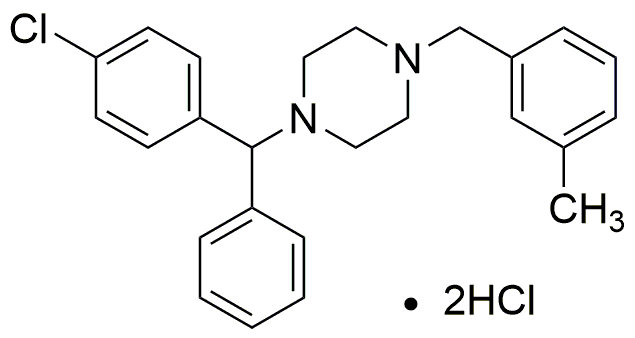Meclizine dihydrochloride is widely utilized in research focused on:
- Motion Sickness Relief: Commonly used in over-the-counter medications to prevent and treat motion sickness, making it essential for travelers and those prone to nausea during movement.
- Vertigo Management: Employed in clinical settings to alleviate symptoms of vertigo, providing relief for patients suffering from balance disorders.
- Antihistamine Applications: Functions as an antihistamine, offering benefits in allergy treatments by reducing symptoms such as itching, sneezing, and runny nose.
- Research in Neurology: Investigated in studies related to neurological conditions, where its effects on the central nervous system can provide insights into treatment options for various disorders.
- Veterinary Medicine: Used in veterinary practices to manage motion sickness in pets, ensuring a more comfortable travel experience for animals and their owners.
Informations générales
Propriétés
Sécurité et réglementation
Applications
Meclizine dihydrochloride is widely utilized in research focused on:
- Motion Sickness Relief: Commonly used in over-the-counter medications to prevent and treat motion sickness, making it essential for travelers and those prone to nausea during movement.
- Vertigo Management: Employed in clinical settings to alleviate symptoms of vertigo, providing relief for patients suffering from balance disorders.
- Antihistamine Applications: Functions as an antihistamine, offering benefits in allergy treatments by reducing symptoms such as itching, sneezing, and runny nose.
- Research in Neurology: Investigated in studies related to neurological conditions, where its effects on the central nervous system can provide insights into treatment options for various disorders.
- Veterinary Medicine: Used in veterinary practices to manage motion sickness in pets, ensuring a more comfortable travel experience for animals and their owners.
Documents
Fiches de données de sécurité (FDS)
La FDS fournit des informations de sécurité complètes sur la manipulation, le stockage et l’élimination du produit.
Spécifications du produit (PS)
Le PS fournit une description complète des propriétés du produit, notamment sa composition chimique, son état physique, sa pureté et les exigences de stockage. Il détaille également les plages de qualité acceptables et les applications prévues du produit.
Certificats d'analyse (COA)
Recherchez des certificats d'analyse (COA) en saisissant le numéro de lot du produit. Les numéros de lot et de lot se trouvent sur l'étiquette d'un produit, après les mots « Lot » ou « Lot de fabrication ».
Numéro de catalogue
Numéro de lot/série
Certificats d'origine (COO)
Ce certificat d'exploitation confirme le pays dans lequel le produit a été fabriqué, et détaille également les matériaux et composants utilisés et s'il est issu de sources naturelles, synthétiques ou autres sources spécifiques. Ce certificat peut être requis pour les douanes, le commerce et la conformité réglementaire.
Numéro de catalogue
Numéro de lot/série
Fiches de données de sécurité (FDS)
La FDS fournit des informations de sécurité complètes sur la manipulation, le stockage et l’élimination du produit.
DownloadSpécifications du produit (PS)
Le PS fournit une description complète des propriétés du produit, notamment sa composition chimique, son état physique, sa pureté et les exigences de stockage. Il détaille également les plages de qualité acceptables et les applications prévues du produit.
DownloadCertificats d'analyse (COA)
Recherchez des certificats d'analyse (COA) en saisissant le numéro de lot du produit. Les numéros de lot et de lot se trouvent sur l'étiquette d'un produit, après les mots « Lot » ou « Lot de fabrication ».
Numéro de catalogue
Numéro de lot/série
Certificats d'origine (COO)
Ce certificat d'exploitation confirme le pays dans lequel le produit a été fabriqué, et détaille également les matériaux et composants utilisés et s'il est issu de sources naturelles, synthétiques ou autres sources spécifiques. Ce certificat peut être requis pour les douanes, le commerce et la conformité réglementaire.


